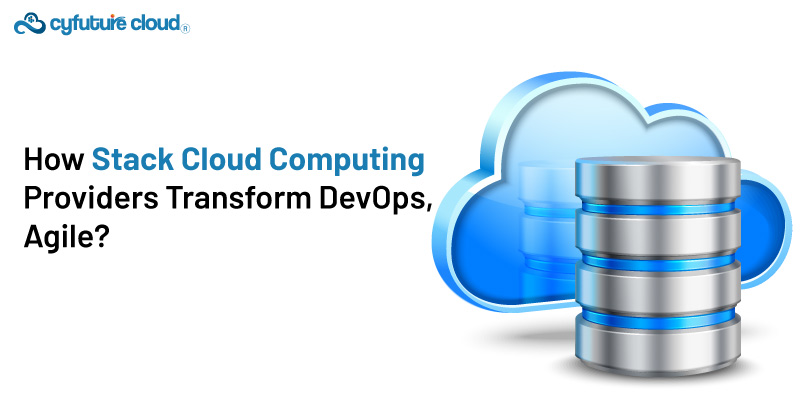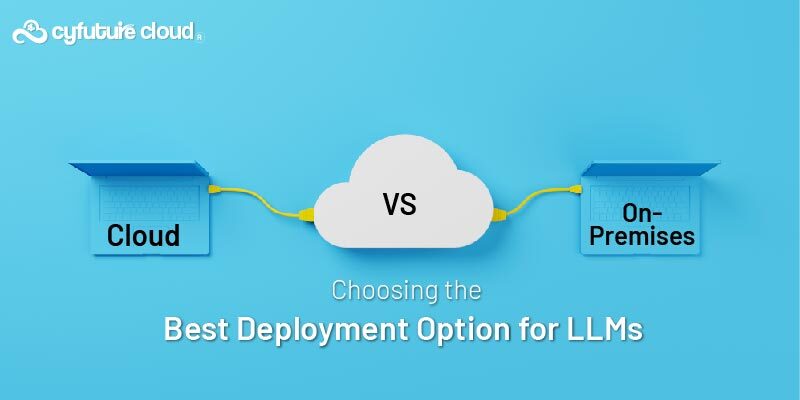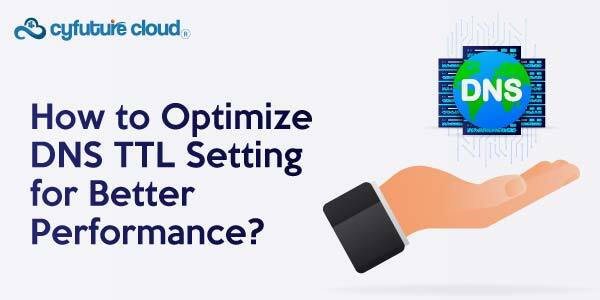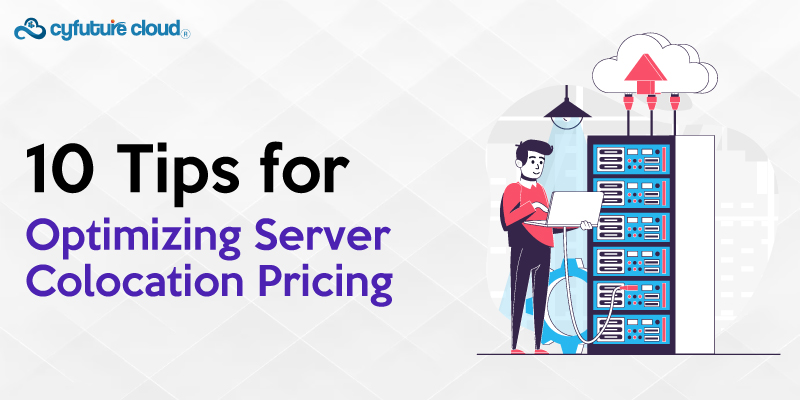Table of Contents
- What is Cloud Migration?
- Advice for an easy move to the cloud
- Why is Cloud Migration Important to Business Growth?
- CLOUD MIGRATION: 9 AMAZING FACTS
- How Cloud Migration Services Aid Business Growth
- 1. Scalability Unleashed
- 2. Cost Efficiency
- 3. Enhanced Collaboration
- 4. Agility
- 5. Improved data security
- 6. Access to Advanced Technologies
- 7. Improved Disaster Recovery and Security
- 8. Global Reach and Accessibility
- 9. Data-Driven Decision-Making
- 10. Competitive Advantage
- 11. Faster Deployment
- 12. Resource Optimization
- 13. Environmental Impact
- 14. Resilience and Business Continuity
- 15. Focusing on Core Strengths
- A Roadmap to Seamless Cloud Transition
- Cyfuture’s Cloud Migration Services:
- How does Cyfuture Cloud deliver the Cloud Migration Service?
- Conclusion
Companies hoping to achieve digital transformation, take advantage of growth prospects, and get ready for disruption must migrate to the cloud.
In a time of lightning-fast technological development, adopting cloud computing has become essential for companies looking to grow and remain competitive. As the driving forces behind this revolutionary journey, cloud migration services and solutions give businesses the ability to completely restructure their operations while increasing scalability and agility.
It’s critical to comprehend cloud migration services and solutions whether you’re an entrepreneur looking to modernise your firm or a CIO managing the digital transformation of your company.
This article explores the realm of cloud migration services, revealing the tactics, advantages, and difficulties associated with utilising the cloud’s capabilities. We’ll look at how businesses of all sizes may use these services to boost productivity, cut expenses, and encourage creativity.
What is Cloud Migration?
A company’s digital assets, including data, apps, systems, and workloads, can be strategically moved from older technology platforms or on-premises infrastructure to cloud-based environments through the process of cloud migration. This shift means virtualized resources and services that are hosted and managed by external cloud providers will replace traditional physical servers and data centres.
Technically speaking, cloud migration is the process of migrating many components of an organization’s IT ecosystem to cloud-based counterparts, including operating systems, databases, software, storage, and networking configurations. These cloud environments offer services that improve an organization’s capacity to store, process, and retrieve data and apps while maintaining scalability, flexibility, and efficiency.
Advice for an easy move to the cloud
- Perform market research to evaluate the performance of various enterprise application types in companies that are similar to yours on the cloud. This can help you determine whether moving to the cloud is right for your company.
- Create an enterprise migration structure that outlines each stakeholder’s specific role in the process.
- Determine who is in charge of the migration.
- Organise settings, procedures, and pertinent documents in a methodical manner.
- There are costs associated with cloud migration that should not be disregarded, so choose a service provider carefully.
- Make sure the cloud services you select fit your company’s demands.
- To stop cyberattacks, make sure you evaluate the risks and implement cybersecurity safeguards.
Why is Cloud Migration Important to Business Growth?
Moving an organization’s digital resources, data, apps, and assets to the cloud is called a cloud migration process. After that, access to the moved assets is restricted to the Cloud’s firewall. The Cloud computing trend has exploded in popularity in recent years thanks to its cutting-edge capabilities and an endless list of commercial advantages. The days of “migration to the cloud” being a topic of discussion are long gone.
Non-cloud customers are encouraged to switch by the flourishing features, time-saving capabilities, convenience of access, better security, and high-quality outputs of cloud computing. Further, the reduced implementation and licensing costs make the Cloud more attractive to business owners.
CLOUD MIGRATION: 9 AMAZING FACTS
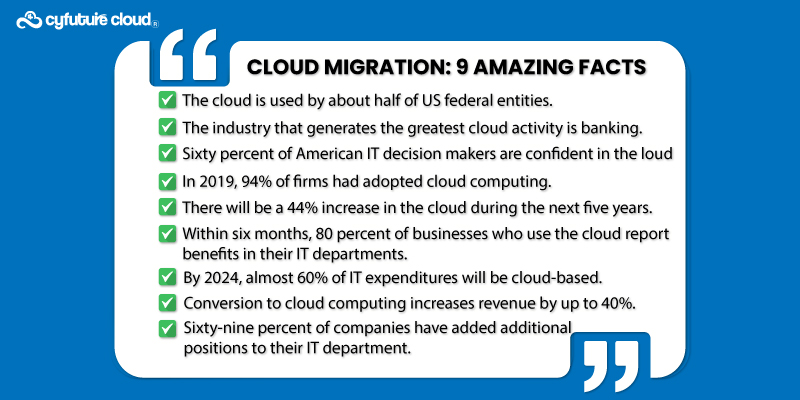
- The cloud is used by about half of US federal entities.
- The industry that generates the greatest cloud activity is banking.
- Sixty percent of American IT decision makers are confident in the loud
- In 2019, 94% of firms had adopted cloud computing.
- There will be a 44% increase in the cloud during the next five years.
- Within six months, 80 percent of businesses who use the cloud report benefits in their IT departments.
- By 2024, almost 60% of IT expenditures will be cloud-based.
- Conversion to cloud computing increases revenue by up to 40%.
- Sixty-nine percent of companies have added additional positions to their IT department.
How Cloud Migration Services Aid Business Growth
Thanks to digital functionality and an almost limitless list of anticipated benefits, cloud computing trends have now impacted every business at every level. High-tech consumer-friendly applications, time-saving, easy availability, access restrictions, and elevated outcome at lower implementation and licensing costs take cloud computing and cloud hosting solutions to the next level and encourage non-cloud businesses to step into it.
Cloud migration is the act of relocating, transferring, migrating, or transitioning workloads, resources, and applications inside the cloud environment made available by various cloud service providers. Cloud migration has completely changed how businesses function and expand. The following are the advantages of working with a seasoned cloud migration services specialist:
1. Scalability Unleashed
Scalability is among the most direct and noticeable advantages of moving to the cloud. It can be difficult to adjust traditional on-premises infrastructure to changing business demands since it might be rigid. Cloud services, on the other hand, can change resource levels as needed. Your IT infrastructure will grow with your company since it is scalable, which means that you may take advantage of opportunities without being limited by hardware.
2. Cost Efficiency
Pay-as-you-go cloud services do away with the necessity of substantial up-front hardware and software purchases. Businesses are able to carefully allocate resources, putting money towards growth-oriented projects like research and innovation, thanks to this economical method.
3. Enhanced Collaboration
Cloud Migration Services can enable greater collaboration among teams, regardless of location. Cloud providers offer a range of collaboration tools, such as file sharing, document collaboration, and video conferencing, that enable teams to work together seamlessly, regardless of physical location. Businesses may maintain their competitiveness by collaborating more effectively and efficiently, spurring development and innovation.
4. Agility
By enabling companies to implement new technologies and procedures more quickly than they could with traditional on-premises infrastructure, cloud migration services can give them more flexibility in how they manage their IT infrastructure. By enabling them to react rapidly to new market trends and client preferences and to innovate in order to stay ahead of the competition, this can help firms stay competitive.
5. Improved data security
Cloud Migration Services can enhance a company’s data security by utilising cloud providers’ cutting-edge security capabilities. Cloud service providers invest a lot of money on security, offering features like encryption, access control, and monitoring to safeguard private information. By safeguarding sensitive data and upholding client confidence, this can assist companies in remaining competitive.
6. Access to Advanced Technologies
Cloud companies are always investing in emerging technologies like data analytics, machine learning, and artificial intelligence (ML). Businesses can utilise these technologies without having to make significant investments in specialised infrastructure thanks to cloud migration.
7. Improved Disaster Recovery and Security
Business continuity is paramount for growth. Cloud service providers can protect your data and operations with strong disaster recovery and security capabilities. This implies that your company can bounce back fast in the event of calamity or security breach, reducing lost time and other damages.
8. Global Reach and Accessibility
Enhancing client interaction and expanding market exposure are two things that are always included in digital transformation. Businesses can host data and apps across a variety of geographic areas through cloud migration, giving stakeholders seamless access to information worldwide regardless of where they are physically located.
9. Data-Driven Decision-Making
Data analytics and storage solutions hosted on the cloud can help make better use of big data. This simplifies the extraction of valuable insights into customer behaviors, operational performances, and market trends, guiding well-informed decision-making, a bedrock of successful digital transformation.
10. Competitive Advantage
Businesses can quickly adapt to changes in the market, create new goods or services, and outwit rivals by utilising cloud technologies. This agility can be a game-changer when it comes to achieving sustained business growth.
11. Faster Deployment
Applications and services can be quickly deployed with the help of cloud migration services. This agility allows businesses to bring new products and features to market more quickly, gaining a competitive edge.
12. Resource Optimization
Resources utilisation monitoring tools are frequently included in cloud platforms. This aids companies in locating inefficient areas and improving the functionality of their services and apps.
13. Environmental Impact
Cloud migration can contribute to a reduction in the carbon footprint of a business. Cloud providers frequently optimise data centres to use less energy, which may have positive effects on the environment.
14. Resilience and Business Continuity
Disaster recovery capabilities are strengthened by cloud migration, which guarantees quick restoration of data and applications in the event of disruptions. This resilience becomes crucial for maintaining business continuity in the face of unanticipated circumstances.
15. Focusing on Core Strengths
Organisations can reallocate internal resources towards strategic innovations and core strengths instead of mundane IT maintenance by outsourcing infrastructure management to cloud providers.
Cloud migration is essentially more than just a technical change; it has become a strategic pillar that enables businesses to completely realise their goals for digital transformation. It is the cornerstone for promoting cost effectiveness, creativity, agility, and improved customer experiences—all essential components for thriving in today’s digital environment.
A Roadmap to Seamless Cloud Transition
Cloud migration services help companies make sense of the complex transition to cloud environments. These services cover a wide range of products and simplify migration procedures while optimising cloud computing capabilities.
Experts examine and plan first, then analyse the current applications and infrastructure to create complete migration strategies that are in line with predetermined goals. Infrastructure as Code (IaC) deployment, data and application migration, and seamless hybrid cloud integration are among the services offered. Cloud security services use evaluations, encryption, and continuous observation to guarantee data security.
In addition, cloud migration service providers offer managed cloud services, training to become proficient in the cloud, cost and performance optimisation, compliance and governance solutions, and backup and disaster recovery plans. Adapted to public, private, or hybrid cloud environments, these offerings simplify migration, empowering businesses to fully embrace cloud technology’s capabilities.
Cyfuture’s Cloud Migration Services:
By partnering with Cyfuture Cloud, enterprises can leverage a suite of tools and services specifically designed to facilitate seamless cloud migration services.
- Migration factory assets and tools: Gain round-the-clock access to Cyfuture Cloud’s subject matter experts, toolkits, configuration management, templates and codes, and security and compliance services. This includes intelligent migration patterns powered by an engine of over 5,000 rules, Our Cloud Migration services comes with no. of assembly lines to meet low-touch and high-touch migration, automated pre- and post-migration tasks with our Cloud Assurance Platform, assuring agile and predictable migrations.
- Our Server Migration Service enables businesses to migrate on-premises virtualized servers to AWS with ease. It permits application continuation throughout the relocation process and automates the server migration procedure.
- Businesses can use database Migration Service to migrate databases to cyfuture cloud quickly and securely. It is appropriate for a range of migration scenarios because it supports multiple source and target databases.
- Application Discovery Service assists in discovering on-premises applications and their dependencies, helping businesses plan their migration strategies effectively.
- Leverage Cyfuture cloud contextual knowledge of the business, industry expertise, and the knowledge of our certified experts to achieve risk-free, quicker migration.
How does Cyfuture Cloud deliver the Cloud Migration Service?
Following is a stepwise cloud migration process that Cyfuture Cloud uses:
- Identify Strategy: We identify and set your cloud strategy and goals based on your workload priorities, business goals, and migration triggers.
- Evaluate Existing Infrastructure: We will conduct a thorough inventory and analysis of your on-premises infrastructure.
- Plan Migration: Timelines, budgets, resources, milestones, and workload priorities form the foundation of an all-inclusive migration plan.
- Prepare your company: We assist you in staying current with cloud technology, migration aids, and operating protocols.
- Execute Migration: Our cloud professionals move your workloads to the cloud in waves, in accordance with the migration strategy you’ve selected.
- Manage and Secure: All of your workloads are managed and kept safe with our cloud services.
Apart from our well-tried and efficient techniques, we also help you reorganise your processes in the following ways:
- Creating a plan, a strategy, and executing a database and application re-platforming, re-architecture, and operational support for a cloud migration
- Thrilling round-the-clock assistance during the whole cloud migration process
- addressing the requirements for migration and infrastructure to reduce errors and interruptions

ConclusionCloud migration is a strategic move that can have a significant impact on corporate growth, not just an improvement in technology. Services for cloud migration give companies a way to move towards greater agility, efficiency, and innovation while lessening the strain of infrastructure management and related expenses.
To optimise these advantages, companies must carefully consider their migration strategy and select the best cloud provider. Cloud migration is still a critical tool for the digital age, helping businesses achieve and maintain growth in an ever-changing landscape.
Send this to a friend

 Server Colocation
Server Colocation CDN Network
CDN Network Linux Cloud Hosting
Linux Cloud Hosting Kubernetes
Kubernetes Pricing Calculator
Pricing Calculator
 Power
Power
 Utilities
Utilities VMware Private Cloud
VMware Private Cloud VMware on AWS
VMware on AWS VMware on Azure
VMware on Azure Service Level Agreement
Service Level Agreement 